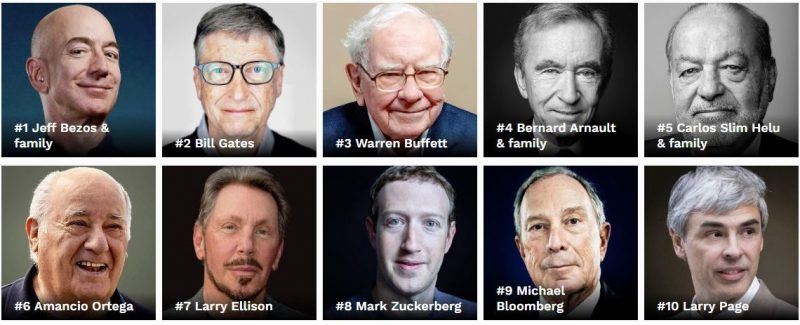
40 million Americans filed for unemployment during the pandemic, but billionaires saw their net worth increase by half a trillion dollars.
From March to June 2020, Amazon founder Jeff Bezos saw his wealth rise by an estimated $48 billion. The founder of the video-conferencing platform Zoom grew his nest egg by over $2.5 billion, and former Microsoft CEO Steve Ballmer’s net worth increased by $15.7 billion.
These kinds of examples might lead you to think that when billionaires profit during a crisis, it’s just a matter of right place, right time. Well, that’s not false, but it’s not entirely true either. Casino magnate Sheldon Adelson saw his wealth increase by $5 billion, while Elon Musk saw an increase of $17.2 billion. When you add up the numbers, billionaires in the United States have increased their total net worth $637 billion during the COVID-19 pandemic so far.
At the same time, more than 40 million Americans filed for unemployment. With tens of millions of Americans out of a paycheck and the stock market plummeting by 37% in March, how is it that the rich have continued getting richer?
This isn’t the first time billionaires have seen gains while a large portion of Americans were feeling losses. When the housing bubble burst in 2007, home prices fell 21% and roughly 3.1 million homes were foreclosed on in the United States. The stock market plummeted by over 50%. And by the end of 2009, 8.8 million Americans had lost their jobs. And the effects lingered. From 2009 to 2012, the incomes of the bottom 99% grew by only 0.4%, but the income of the top 1% grew by a staggering 31.4% in the same time span. And it all ties back to two things.
First, the government disproportionately gave more aid to banks and corporations. In 2008, the Emergency Economic Stabilization Act was signed into law, creating a $700 billion program to purchase devalued assets from banks. This was called the Troubled Asset Relief Program, or TARP. Later, President Obama would direct $75 billion in funds from TARP to help reduce interest payments for homeowners. That means homeowners received around 10% of the direct relief that banks and corporations did.
And this leads to reason No. 2. When the stock market bounced back, the unequal bailouts meant that the wealthy still had money on hand to invest and thus profit, while the middle and lower classes did not. In 2008, the Federal Reserve lowered short-term interest rates to near zero. They would remain that low for nearly a decade. This paved the way for a historic bull market on Wall Street that began in 2009 and lasted until March 2020, when the pandemic hit.
In that time, the S&P 500 gained 462%. That means that a $1,000 investment in the S&P 500 at the low point of the financial crisis could have returned roughly $4,620, while someone who could afford a $1 million investment could have pulled in over $4.6 million.
By 2009, the world’s high-net-worth individuals had grown their share of global wealth by 19% to $39 trillion, recouping nearly all of their losses in a single year. That quick recovery and larger share of the world’s wealth enabled them to continue to make money at an exponential rate. In fact, the top 1% captured 95% of the income gains made from 2009 to 2012. And by 2020, the combined wealth of the billionaire class in the United States had increased by over 80%.
Which brings us back to the moment when the coronavirus pandemic rocked the economy. In 2019, the Fed reported that four in 10 Americans didn’t have enough cash in their bank accounts to cover a $400 unexpected expense. And in the first few months of 2020, 40 million Americans found themselves unemployed due to COVID-19. Many small businesses had to close due to lockdowns and social distancing, while others were forced to try to operate with entirely remote staff.
The Small Business Administration made $349 billion available to small businesses with the Paycheck Protection Program. But like in 2008, $243 million of that was snapped up by large, publicly traded corporations, some of which were valued at over $100 million. Even hedge funds submitted claims to try to tap into what they saw as free money.
On March 16, 2020, just five days after COVID-19 was declared a pandemic, the Dow suffered the worst single-day points drop in its history. But by June 4, seven of the world’s richest people had seen their fortunes increase by over 50%. Part of what made this possible was a stock-market rebound fueled both by the Paycheck Protection Program and actions by the Fed. Again, the Fed lowered short-term interest rates for banks to near 0%, and as before, they have promised to hold those rates low until the economy is on track.
This is a cycle that has happened time and time again. During the earthquake in Haiti in 2010, only 2.5% of the $195 million of relief funds went to Haitian companies. Much of the rest was awarded to DC-based construction companies. And when Hurricane Katrina struck New Orleans in 2005, real-estate developer Joseph Canizaro said the clearing out caused by Katrina represented some “very big opportunities.” Canizaro was selected as part of a panel to develop the Bring New Orleans Back plan, part of which put a stop on reconstruction of low-income neighborhoods until the residents returned. Of course, residents couldn’t return to their destroyed homes, and many were foreclosed on, paving the way for others to buy those properties and develop them.
When the time did come to rebuild New Orleans, the engineering and construction company KBR received no-bid contracts from the federal government for tens of millions of dollars. KBR received $31 billion in contracts from the government between 2001 and 2010. Vice President Dick Cheney served as CEO of KBR’s parent company, Halliburton, for the five years leading up to his two terms in office.
Combined with their immense investing and purchasing power, billionaires have had government resources in addition to their own resources to profit from during economic upheavals. And wealth-friendly tax laws and loopholes then keep those billionaires at the top. Legal structures such as limited liability companies protect personal assets from being repossessed to pay the debts from business downturns. As it’s set up today, IRS rules allowed Amazon to pay $0 in taxes two years in a row. When its bill finally came due in 2019, it paid just $162 million, a measly 1.2% of the company’s income that year.
And it’s not just Amazon. Taxes paid by billionaires have decreased 79% since 1980. And those are just the legal avenues that the wealthy take to avoid paying taxes. In 2017, researchers estimated that about 10% of the world’s GDP was stashed in offshore tax havens. A study in 2012 found that as much as $32 trillion was being held offshore by the world’s wealthiest people.
So, after reviewing all this, what can be done to help level the playing field? A recent report by the Institute for Policy Studies lays out several action items. It suggests forming a pandemic profiteering oversight committee that would go beyond the oversight of federal stimulus money. It also supports the Corporate Transparency Act, which would create stronger regulations to prevent US billionaires from using shell corporations to hide their income. After the House passed the bill in 2019, it was introduced in the Senate but has not been brought to a vote.
Other suggestions include an emergency 10% millionaire income surtax, a stimulus package aimed at funding charities, instituting a wealth tax, and reducing the amount allowed by the gift and estate tax. Last, and perhaps most importantly, the report underscores the need to shut down the global hidden-wealth economy. The US alone is estimated to lose nearly $200 billion in tax revenues to offshore havens each year. That’s roughly three times the amount of all the money budgeted for the Department of Education in 2021.
Changes like the ideas above are global in scale and require political cooperation to become reality. If the relationship between wealth and income inequality are ever going to change, it’s going to require all of us.
Source: BusinessInsider


